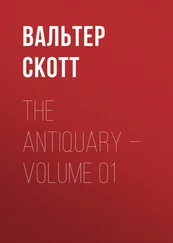Вальтер Скотт - Waverley Novels — Volume 12
Здесь есть возможность читать онлайн «Вальтер Скотт - Waverley Novels — Volume 12» — ознакомительный отрывок электронной книги совершенно бесплатно, а после прочтения отрывка купить полную версию. В некоторых случаях можно слушать аудио, скачать через торрент в формате fb2 и присутствует краткое содержание. Жанр: foreign_antique, foreign_prose, Альтернативная история, на английском языке. Описание произведения, (предисловие) а так же отзывы посетителей доступны на портале библиотеки ЛибКат.
- Название:Waverley Novels — Volume 12
- Автор:
- Жанр:
- Год:неизвестен
- ISBN:нет данных
- Рейтинг книги:5 / 5. Голосов: 1
-
Избранное:Добавить в избранное
- Отзывы:
-
Ваша оценка:
- 100
- 1
- 2
- 3
- 4
- 5
Waverley Novels — Volume 12: краткое содержание, описание и аннотация
Предлагаем к чтению аннотацию, описание, краткое содержание или предисловие (зависит от того, что написал сам автор книги «Waverley Novels — Volume 12»). Если вы не нашли необходимую информацию о книге — напишите в комментариях, мы постараемся отыскать её.
Waverley Novels — Volume 12 — читать онлайн ознакомительный отрывок
Ниже представлен текст книги, разбитый по страницам. Система сохранения места последней прочитанной страницы, позволяет с удобством читать онлайн бесплатно книгу «Waverley Novels — Volume 12», без необходимости каждый раз заново искать на чём Вы остановились. Поставьте закладку, и сможете в любой момент перейти на страницу, на которой закончили чтение.
Интервал:
Закладка:
This account of the Varangian Guard is strictly historical, and might be proved by reference to the Byzantine historians; most of whom, and also Villehardouin's account of the taking of the city of Constantinople by the Franks and Venetians, make repeated mention of this celebrated and singular body of Englishmen, forming a mercenary guard attendant on the person of the Greek Emperors. [Footnote: Ducange has poured forth a tide of learning on this curious subject, which will be found in his Notes on Villehardouin's Constantinople under the French Emperors. — Paris, 1637, folio, p. 196. Gibbon's History may also be consulted, vol. x. p. 231.
Villehardouin, in describing the siege of Constantinople, A. D. 1203, says, "'Li murs fu mult garnis d'Anglois et de Danois," — hence the dissertation of Ducange here quoted, and several articles besides in his Glossarium, as Varangi , Warengangi, &c. The etymology of the name is left uncertain, though the German fort-ganger , i. e. forth-goer, wanderer, exile , seems the most probable. The term occurs in various Italian and Sicilian documents, anterior to the establishment of the Varangian Guards at Constantinople, and collected by Muratori: as, for instance, in an edict of one of the Lombard kings, "Omnes Warengrangi, qui de extens finibus in regni nostri finibus advenerint seque sub scuto potestatis nostrae subdiderint, legibus nostris Longobardorum vivere debeant," — and in another, "De Warengangis, nobilibus, mediocribus, et rusticis hominibus, qui usque nune in terra vestra fugiti sunt, habeatis eos." — Muratori , vol. ii. p. 261.
With regard to the origin of the Varangian Guard, the most distinct testimony is that of Ordericus Vittalis, who says, "When therefore the English had lost their liberty, they turned themselves with zeal to discover the means of throwing off the unaccustomed yoke. Some fled to Sueno, King of the Danes, to excite him to the recovery of the inheritance of his grandfather, Canute. Not a few fled into exile in other regions, either from the mere desire of escaping from under the Norman rule, or in the hope of acquiring wealth, and so being one day in a condition to renew the struggle at home. Some of these, in the bloom of youth, penetrated into a far distant land, and offered themselves to the military service of the Constantinopolitan Emperor — that wise prince, against whom Robert Guiscard, Duke of Apulia, had then raised all his forces. The English exiles were favourably received, and opposed in battle to the Normans, for whose encounter the Greeks themselves were too weak. Alexius began to build a town for the English, a little above Constantinople, at a place called Chevelot , but the trouble of the Normans from Sicily still increasing, he soon recalled them to the capital, and intrusted the princial palace with all its treasures to their keeping. This was the method in which the Saxon English found their way to Ionia, where they still remain, highly valued by the Emperor and the people." — Book iv. p. 508.]
Having said enough to explain why an individual Varangian should be strolling about the Golden Gate, we may proceed in the story which we have commenced.
Let it not be thought extraordinary, that this soldier of the life-guard should be looked upon with some degree of curiosity by the passing citizens. It must be supposed, that, from their peculiar duties, they were not encouraged to hold frequent intercourse or communication with the inhabitants; and, besides that they had duties of police occasionally to exercise amongst them, which made them generally more dreaded than beloved, they were at the same time conscious, that their high pay, splendid appointments, and immediate dependence on the Emperor, were subjects of envy to the other forces. They, therefore, kept much in the neighbourhood of their own barracks, and were seldom seen straggling remote from them, unless they had a commission of government intrusted to their charge.
This being the case, it was natural that a people so curious as the Greeks should busy themselves in eyeing the stranger as he loitered in one spot, or wandered to and fro, like a man who either could not find some place which he was seeking, or had failed to meet some person with whom he had an appointment, for which the ingenuity of the passengers found a thousand different and inconsistent reasons. "A Varangian," said one citizen to another, "and upon duty — ahem! Then I presume to say in your ear" —
"What do you imagine is his object?" enquired the party to whom this information was addressed.
"Gods and goddesses! do you think I can tell you? but suppose that he is lurking here to hear what folk say of the Emperor," answered the quid-nunc of Constantinople.
"That is not likely,"' said the querist; "these Varangians do not speak our language, and are not extremely well fitted for spies, since few of them pretend to any intelligible notion of the Grecian tongue. It is not likely, I think, that the Emperor would employ as a spy a man who did not understand the language of the country."
"But if there are, as all men fancy," answered the politician, "persons among these barbarian soldiers who can speak almost all languages, you will admit that such are excellently qualified for seeing clearly around them, since they possess the talent of beholding and reporting, while no one has the slightest idea of suspecting them."
"It may well be," replied his companion; "but since we see so clearly the fox's foot and paws protruding from beneath the seeming sheep's fleece, or rather, by your leave, the bear's hide yonder, had we not better be jogging homeward, ere it be pretended we have insulted a Varangian Guard?"
This surmise of danger insinuated by the last speaker, who was a much older and more experienced politician than his friend, determined both on a hasty retreat. They adjusted their cloaks, caught hold of each other's arm, and, speaking fast and thick as they started new subjects of suspicion, they sped, close coupled together, towards their habitations, in a different and distant quarter of the town.
In the meantime, the sunset was nigh over; and the long shadows of the walls, bulwarks, and arches, were projecting from the westward in deeper and blacker shade. The Varangian seemed tired of the short and lingering circle in which he had now trodden for more than an hour, and in which he still loitered like an unliberated spirit, which cannot leave the haunted spot till licensed by the spell which has brought it hither. Even so the barbarian, casting an impatient glance to the sun, which was setting in a blaze of light behind a rich grove of cypress-trees, looked for some accommodation on the benches of stone which were placed under shadow of the triumphal arch of Theodosius, drew the axe, which was his principal weapon, close to his side, wrapped his cloak about him, and, though his dress was not in other respects a fit attire for slumber, any more than the place well selected for repose, yet in less than three minutes he was fast asleep. The irresistible impulse which induced him to seek for repose in a place very indifferently fitted for the purpose, might be weariness consequent upon the military vigils, which had proved a part of his duty on the preceding evening. At the same time, his spirit was so alive within him, even while he gave way to this transient fit of oblivion, that he remained almost awake even with shut eyes, and no hound ever seemed to sleep more lightly than our Anglo-Saxon at the Golden Gate of Constantinople.
And now the slumberer, as the loiterer had been before, was the subject of observation to the accidental passengers. Two men entered the porch in company. One was a somewhat slight made, but alert-looking man, by name Lysimachus, and by profession a designer. A roll of paper in his hand, with a little satchel containing a few chalks, or pencils, completed his stock in trade; and his acquaintance with the remains of ancient art gave him a power of talking on the subject, which unfortunately bore more than due proportion to his talents of execution. His companion, a magnificent-looking man in form, and so far resembling the young barbarian, but more clownish and peasant-like in the expression of his features, was Stephanos the wrestler, well known in the Palestra.
Читать дальшеИнтервал:
Закладка:
Похожие книги на «Waverley Novels — Volume 12»
Представляем Вашему вниманию похожие книги на «Waverley Novels — Volume 12» списком для выбора. Мы отобрали схожую по названию и смыслу литературу в надежде предоставить читателям больше вариантов отыскать новые, интересные, ещё непрочитанные произведения.
Обсуждение, отзывы о книге «Waverley Novels — Volume 12» и просто собственные мнения читателей. Оставьте ваши комментарии, напишите, что Вы думаете о произведении, его смысле или главных героях. Укажите что конкретно понравилось, а что нет, и почему Вы так считаете.












